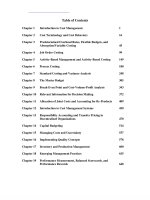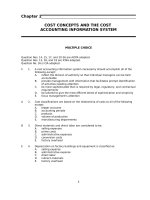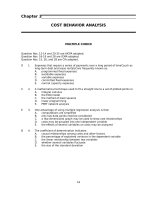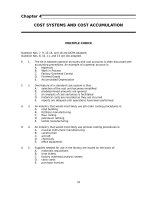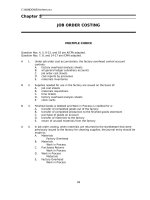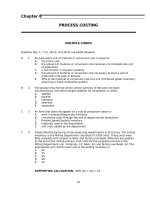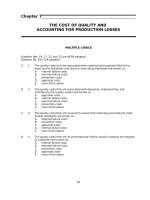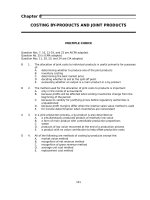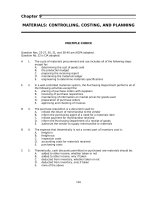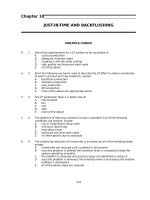Test bank cost accounting 6e by usry 05 job order costing
Bạn đang xem bản rút gọn của tài liệu. Xem và tải ngay bản đầy đủ của tài liệu tại đây (85.87 KB, 15 trang )
Chapter 5
JOB ORDER COSTING
MULTIPLE CHOICE
Question Nos. 4, 5, 9-13, and 18 are AICPA adapted.
Question Nos. 7, 8, and 14-17 are ICMA adapted.
A
1.
Under job order cost accumulation, the factory overhead control account controls:
A.
factory overhead analysis sheets
B.
all general ledger subsidiary accounts
C.
job order cost sheets
D.
cost reports by processes
E.
materials inventories
B
2.
Supplies needed for use in the factory are issued on the basis of:
A.
job cost sheets
B.
materials requisitions
C.
time tickets
D.
factory overhead analysis sheets
E.
clock cards
B
3.
Finished Goods is debited and Work in Process is credited for a:
A.
transfer of completed goods out of the factory
B.
transfer of completed production to the finished goods storeroom
C.
purchase of goods on account
D.
transfer of materials to the factory
E.
return of unused materials from the factory
A
4.
In job order costing, when materials are returned to the storekeeper that were previously
issued to the factory for cleaning supplies, the journal entry should be made to:
A.
Materials
Factory Overhead
B.
Materials
Work in Process
C.
Purchases Returns
Work in Process
D.
Work in Process
Materials
E.
Factory Overhead
Work in Process
46
47
Chapter 5
A
5.
Under a job order cost system, the dollar amount of the entry to transfer the inventory from
Work in Process to Finished Goods is the sum of the costs charged to all jobs:
A.
completed during the period
B.
started in process during the period
C.
in process during the period
D.
completed and sold during the period
E.
none of the above
B
6.
When a manufacturing company has a highly automated plant producing many different
products, probably the most appropriate basis of applying factory overhead costs to Work in
Process is:
A.
units processed
B.
machine hours
C.
direct labor hours
D.
direct labor dollars
E.
none of the above
A
7.
Cherokee Company applies factory overhead on the basis of direct labor hours. Budget and
actual data for direct labor and overhead for the year are as follows:
Direct labor hours..............................................................................
Factory overhead costs.....................................................................
Budget
600,000
$720,000
The factory overhead for Cherokee for the year is:
A.
overapplied by $20,000
B.
overapplied by $40,000
C.
underapplied by $20,000
D.
underapplied by $40,000
E.
neither underapplied nor overapplied
SUPPORTING CALCULATION:
$720,000
= $1.20 _ 650,000
600,000
= $780,000 (applied) $760,000 (actual)= $20,000 (overapplied)
Actual
650,000
$760,000
Job Order Costing
C
8.
48
At the end of the year, Paola Company had the following account balances after applied
factory overhead had been closed to Factory Overhead Control:
Factory Overhead Control........................................................................................
Cost of Goods Sold.....................................................................................................
Work in Process...........................................................................................................
Finished Goods............................................................................................................
$
1,000
980,000
38,000
82,000
CR
DR
DR
DR
The most common treatment of the balance in Factory Overhead Control would be to:
A.
carry it as a deferred credit on the balance sheet
B.
report it as miscellaneous operating revenue on the income statement
C.
credit it to Cost of Goods Sold
D.
prorate it between Work in Process and Finished Goods
E.
prorate it among Work in Process, Finished Goods, and Cost of Goods Sold
B
9.
Overapplied factory overhead would result if:
A.
the plant were operated at less than normal capacity
B.
factory overhead costs incurred were less than costs charged to production
C.
factory overhead costs incurred were unreasonably large in relation to units produced
D.
factory overhead costs incurred were greater than costs charged to production
E.
a firm incurred a significant amount of overhead
A
10.
The Waitkins Company estimated Department A's overhead at $255,000 for the period based
on an estimated volume of 100,000 direct labor hours. At the end of the period, the factory
overhead control account for Department A had a balance of $265,500; actual direct labor
hours were 105,000. What was the over- or under-applied overhead for the period?
A.
$2,250
B.
$(2,250)
C.
$15,000
D.
$(15,000)
E.
$(5,000)
SUPPORTING CALCULATION:
49
Chapter 5
$255,000
= $2.55 _ 105,000 = $267,750 (applied) $265,500 (actual)
100,000
= $2,250 (overapplied)
D
11.
Howell Corporation has a job order cost system. The following debits (credits) appeared in
Work in Process for the month of July:
July 1, balance...................................................................................................................
July 31, direct materials..................................................................................................
July 31, direct labor.........................................................................................................
July 31, factory overhead................................................................................................
July 31, to finished goods...............................................................................................
$ 12,000
40,000
30,000
27,000
(100,000)
Howell applies overhead to production at a predetermined rate of 90% based on the direct
labor cost. Job 1040, the only job still in process at the end of July, has been charged with
factory overhead of $2,250. What was the amount of direct materials charged to Job 1040?
A.
$6,750
B.
$2,250
C.
$2,500
D.
$4,250
E.
$9,000
SUPPORTING CALCULATION:
Job 1040 = $12,000 + $40,000 + $30,000 + $27,000 - $100,000 = $9,000
Direct materials = $9,000
E
12.
$2,250
$2,250 = $4,250
.9
Valentino Corporation makes aluminum fasteners. Among Valentino's 19-- manufacturing
costs were:
Wages and salaries:
Machine operators...................................................................................................
Factory supervisors.................................................................................................
Machine mechanics..................................................................................................
Direct labor amounted to:
A.
$50,000
B.
$100,000
C.
$110,000
D.
$130,000
E.
none of the above
$80,000
30,000
20,000
Job Order Costing
B
13.
50
Rudolpho Corporation makes aluminum fasteners. Among Rudolpho's 19-- manufacturing
costs were:
Materials and supplies:
Aluminum........................................................................................................................
Machine parts.................................................................................................................
Lubricants for machines...............................................................................................
$400,000
18,000
5,000
Direct materials amounted to:
A.
$23,000
B.
$400,000
C.
$405,000
D.
$418,000
E.
$423,000
C
14.
Selected cost data (in thousands) concerning the past fiscal year's operations of the Moscow
Manufacturing Company are presented below.
Materials..............................................................................................
Work in process..................................................................................
Finished goods....................................................................................
Inventories
Beginning
Ending
$75
$ 85
80
30
90
110
Materials used, $326
Total manufacturing costs charged to production during the year (including direct materials,
direct labor, and factory overhead applied at the rate of 60% of direct labor cost), $686
Cost of goods available for sale, $826
Selling and general expenses, $25
The cost of direct materials purchased during the year amounted to:
A.
$360
B.
$316
C.
$336
D.
$411
E.
none of the above
SUPPORTING CALCULATION: $326 + $85 - $75 = $336
51
C
Chapter 5
15.
Selected cost data (in thousands) concerning the past fiscal year's operations of the Moscow
Manufacturing Company are presented below.
Materials..............................................................................................
Work in process..................................................................................
Finished goods....................................................................................
Inventories
Beginning
Ending
$75
$ 85
80
30
90
110
Materials used, $326
Total manufacturing costs charged to production during the year (including direct materials,
direct labor, and factory overhead applied at the rate of 60% of direct labor cost), $686
Cost of goods available for sale, $826
Selling and general expenses, $25
Direct labor costs charged to production during the year amounted to:
A.
$216
B.
$135
C.
$225
D.
$360
E.
none of the above
SUPPORTING CALCULATION:
A
16.
$686 = $326 + x + .6x
x = $225
Selected cost data (in thousands) concerning the past fiscal year's operations of the Moscow
Manufacturing Company are presented below.
Materials..............................................................................................
Work in process..................................................................................
Finished goods....................................................................................
Inventories
Beginning
Ending
$75
$ 85
80
30
90
110
Materials used, $326
Total manufacturing costs charged to production during the year (including direct materials,
direct labor, and factory overhead applied at the rate of 60% of direct labor cost), $686
Cost of goods available for sale, $826
Selling and general expenses, $25
The cost of goods manufactured during the year was:
A.
$736
B.
$716
C.
$636
D.
$766
E.
none of the above
SUPPORTING CALCULATION: $80 + $686 - $30 = $736
Job Order Costing
A
17.
52
Selected cost data (in thousands) concerning the past fiscal year's operations of the Moscow
Manufacturing Company are presented below.
Inventories
Materials..............................................................................................
Work in process..................................................................................
Finished goods....................................................................................
Beginning
$75
80
90
Ending
$ 85
30
110
Materials used, $326
Total manufacturing costs charged to production during the year (including direct materials,
direct labor, and factory overhead applied at the rate of 60% of direct labor cost), $686
Cost of goods available for sale, $826
Selling and general expenses, $25
The cost of goods sold during the year was:
A.
$716
B.
$691
C.
$801
D.
$736
E.
none of the above
SUPPORTING CALCULATION: $90 + $736 - $110 = $716
A
18.
J. D. Doonesbury Company manufactures tools to customer specifications. The following
data pertain to Job 1501 for April:
Direct materials used.........................................................................................................
Direct labor hours worked...............................................................................................
Direct labor rate per hour................................................................................................
Machine hours used...........................................................................................................
Applied factory overhead rate per machine hour.......................................................
What
A.
B.
C.
D.
E.
$ 4,200
300
$ 8.00
200
$ 15.00
is the total manufacturing cost recorded on Job 1501 for April?
$9,600
$10,300
$11,100
$5,400
$8,800
SUPPORTING CALCULATION: $4,200 + (300 x $8) + (200 x $15) = $9,600
C
19.
In service businesses using job order costing, the most commonly used base for applying
overhead to jobs is:
A.
machine hours
B.
direct materials consumed
C.
direct labor cost
D.
meals, travel, and entertainment
E.
none of the above
53
Chapter 5
A
20.
In service businesses using job order costing, the hourly rate used to charge costs to a job
usually includes:
A.
both labor and overhead cost
B.
labor cost only
C.
overhead cost only
D.
labor, overhead, and miscellaneous costs
E.
none of the above
A
21.
Work in Process is debited and Materials is credited for:
A.
the issuance of direct materials into production
B.
the issuance of indirect materials into production
C.
the return of materials to the storeroom
D.
the application of materials overhead
E.
none of the above
B
22.
Factory Overhead Control is debited and Payroll is credited for:
A.
the recording of payroll
B.
the distribution of indirect labor costs
C.
the distribution of direct labor costs
D.
the distribution of withholding taxes
E.
none of the above
A
23.
Applied Factory Overhead is debited and Factory Overhead is credited to:
A.
close the estimated overhead account to actual overhead
B.
record the actual factory overhead for the period
C.
charge estimated overhead to all jobs worked on during the period
D.
to record overapplied overhead for the period
E.
none of the above
C
24.
The best overhead allocation base to use in a labor-intensive manufacturing environment
probably would be:
A.
materials cost
B.
machine hours
C.
direct labor hours
D.
units of production
E.
none of the above
D
25.
Finished Goods is debited and Cost of Goods Sold is credited for:
A.
transfer of completed goods to the customer
B.
sale of a customer order
C.
return of materials to the supplier
D.
return of goods by the customer
E.
none of the above
Job Order Costing
54
PROBLEMS
PROBLEM
1.
Job Order Cost Schedule. Winkel Woodcrafters produces special-order wood products. The company uses
job order costing for pricing and cost accumulation purposes. The following costs were incurred on two
recent jobs:
Cost Item.........................................................
Direct materials:
Issued.........................................................
Returned....................................................
Indirect materials used.................................
Direct labor.....................................................
Direct labor rate.............................................
Overhead application rate...........................
Job Pine-20
$6,500
500
500
$9,000
$9 per hour
$10 per direct labor hour
Job Birch-10
$8,000
0
400
$15,000
$10 per hour
$15 per direct labor hour
The company adds a 50% markup on cost in determining the amount to charge for each job.
Required: Prepare a schedule showing the cost and the amount to be charged for each job.
SOLUTION
Direct materials.........................................................................................
Direct labor................................................................................................
Factory overhead applied ......................................................................
Total.......................................................................................................
Allowance for profit and other costs....................................................
Amount to be charged.............................................................................
Job Pine-20
$ 6,000
9,000
10,000
$ 25,000
12,500
$ 37,500
Job Birch-10
$ 8,000
15,000
22,500
$ 45,500
22,750
$ 68,250
PROBLEM
2.
Job Order Cost Sheet; Over- or Underapplied Overhead. During June, the following transactions took
place at the Cassandran Corp.
June
3
5
7
8
10
14
Purchased materials, $30,000.
Requisitioned materials from inventory, $20,000 (75% of these were direct; 25% were
indirect). Direct materials of $3,000 and indirect materials of $1,000 were for Job 00-1. The
remainder were for Job 00-2.
For Job 00-2, returned $150 of direct materials and $200 of indirect materials.
Recorded liabilities for payroll: direct labor, $15,000 and indirect labor, $5,000. Of the direct
labor cost, 60% was for Job 00-1; the remainder was for Job 00-2.
Incurred other factory overhead costs, $20,000 (all applicable to Jobs 00 -1 and 00-2).
Applied overhead at the rate of 200% of direct labor cost to Jobs 00-1 and 00-2, which were
completed and transferred to finished goods account today.
55
Chapter 5
Required: Assuming that Jobs 00-1 and 00-2 were the only jobs during the period and that all overhead (as
recorded above) is the total applicable overhead for these projects:
(1)
(2)
Prepare a job order cost sheet for each job.
Determine the difference between applied and actual overhead for the month.
SOLUTION
(1)
Materials............................................................................................................................
Labor..................................................................................................................................
Overhead applied.............................................................................................................
Total cost............................................................................................................................
(2)
Analysis of Factory Overhead
Incurred:
Indirect materials......................................................................................................
Indirect labor..............................................................................................................
Other overhead incurred..........................................................................................
Applied:
Job 00-1.......................................................................................................................
Job 00-2.......................................................................................................................
Amount overapplied .......................................................................................................
Job 00 -1
3,000
9,000
18,000
$ 30,000
$
$
$
4,800
5,000
20,000
18,000
12,000
Job 00 -2
11,850
6,000
12,000
$ 29,850
$
$
29,800
$
30,000
(200 )
PROBLEM
3.
Job Order Cycle Entries. The following completed cost sheets were prepared for three jobs that were in
production during April in the Special Order Division of Byron Company:
Direct materials....................................................................................
Direct labor............................................................................................
Applied factory overhead...................................................................
Allowance for commercial expenses and profit.............................
Job 097
$ 6,000
9,200
6,900
11,050
Job 781
$2,700
7,300
5,475
7,738
Job 946
$4,100
8,200
6,120
9,210
On April 1, Job 097 was 75% complete as to materials, labor, and overhead. It was finished during the
month. The other jobs were started and finished during the month. Jobs 097 and 946 were sold on
account at the end of the month.
Required: Prepare general journal entries to be recorded in April to accumulate these job costs for Work in
Process as well as for Finished Goods and for the sale of the two jobs.
Job Order Costing
56
SOLUTION
Work in Process...........................................................................................................
Materials.................................................................................................................
Debit
8,300 *
Work in Process...........................................................................................................
Accrued Payroll....................................................................................................
17,800 **
Work in Process...........................................................................................................
Factory Overhead Control..................................................................................
13,320 ***
Finished Goods............................................................................................................
Work in Process....................................................................................................
55,995
Cost of Goods Sold.....................................................................................................
Finished Goods.....................................................................................................
40,520
Accounts Receivable...................................................................................................
Sales.........................................................................................................................
60,780
Credit
8,300
17,800
13,320
55,995
40,520
60,780
* (.25 x $6,000) + $2,700 + $4,100
** (.25 x $9,200) + $7,300 + $8,200
*** (.25 x $6,900) + $5,475 + $6,120
PROBLEM
4.
Voyager Inc. produces customized vans in a job order shop. On November 1, the following balances
appear in the inventory records:
Finished goods.............................................................................................................................................
Work in process...........................................................................................................................................
Materials.......................................................................................................................................................
$179,000
308,000
83,000
The amount in Finished Goods represents $101,000 recorded for Van 175 and $78,000 recorded for Van
177. The work in process account represents the three vans in process, as follows:
Factory overhead.................................................................................
Direct labor............................................................................................
Direct materials....................................................................................
Van 179
$75,000
60,000
26,000
Van 180
$50,000
40,000
7,000
Van 181
$25,000
20,000
5,000
57
Chapter 5
The following transactions occurred during November:
(a)
Purchased materials on account, $80,000.
(b)
Requisitioned $60,000 of materials from inventory: $15,000 applied to Van 180, $25,000 to Van 181,
and $16,000 to Van 182, a new order; the balance was for indirect materials.
(c)
Recorded the liability for the payroll and the labor cost distribution in a single entry: total payroll,
$208,750. Of the payroll cost, 10% applied to Van 179, 20% to Van 180, 35% to Van 181, 30% to
Van 182, and the remainder to indirect labor.
(d)
Paid the payroll.
(e)
Applied factory overhead at the rate of 150% of direct labor cost.
(f)
Completed Vans 179 and 180.
(g)
Sold Vans 175, 177, and 180 at 50% over manufacturing costs.
Required: Prepare general journal entries to record these transactions.
SOLUTION
(a)
(b)
Materials.............................................................................................................
Accounts Payable......................................................................................
Debit
80,000
80,000
Factory Overhead Control..............................................................................
Work in Process.................................................................................................
Materials.....................................................................................................
4,000
56,000
Factory Overhead Control..............................................................................
Work in Process.................................................................................................
Accrued Payroll.........................................................................................
10,437
198,313
(d)
Accrued Payroll.................................................................................................
Cash.............................................................................................................
208,750
(e)
Work in Process.................................................................................................
Applied Factory Overhead......................................................................
297,470
(f)
Finished Goods..................................................................................................
Work in Process.........................................................................................
429,563
(g)
Accounts Receivable.........................................................................................
Sales.............................................................................................................
593,063
Cost of Goods Sold...........................................................................................
Finished Goods..........................................................................................
395,375
(c)
Credit
60,000
208,750
208,750
297,470
429,563
593,063
395,375
Job Order Costing
58
PROBLEM
5.
Manufacturing Costs. The work in process account of Meyers Company showed:
Materials
Direct labor
Factory overhead
Work in Process
$22,000 | Finished goods
37,000 |
55,500 |
$68,000
Materials charged to the one job still in process amounted to $5,000. Factory overhead is applied as a
predetermined percentage of direct labor cost.
Required: Compute the following:
(1)
(2)
The amount of direct labor cost in finished goods.
The amount of factory overhead in finished goods.
SOLUTION
(1)
The amount of direct labor in finished goods:
Finished goods.................................................................................................................................
Materials included in finished goods..........................................................................................
Direct labor and factory overhead in finished goods...............................................................
$68,000
17,000
$51,000
Factory overhead charged to work in process $55,500
=
= 1.5
Direct labor charged to work in process
$37,000
Let x = direct labor in finished goods
2.5x = $51,000 direct labor and factory overhead in finished goods
x = $20,400 direct labor in finished goods
(2)
The amount of factory overhead in finished goods:
x = $20,400
1.5x = 1.5($20,400)
1.5x = $30,600 factory overhead in finished goods
PROBLEM
6.
Manufacturing Costs. Teddy Company is to submit a bid on the production of 5,500 vases. It is estimated
that the cost of materials will be $8,500, and the cost of direct labor will be $12,000. Factory overhead is
applied at 50% of direct labor cost in the Molding Department and at $7.50 per direct labor hour in the
Finishing Department. Of the above direct labor, it is estimated that 500 direct labor hours at a cost of
$4,000 will be required in Finishing. The company wishes a markup of 100% of its total production cost.
59
Chapter 5
Required: Determine the following:
(1)
(2)
(3)
(4)
Estimated cost to produce.
Estimated prime cost.
Estimated conversion cost.
Bid price.
SOLUTION
(1)
Materials....................................................................................................................................
Direct labor................................................................................................................................
Factory overhead:
Molding (50% x $8,000)...................................................................................................
Finishing (500 DLH x $7.50)...........................................................................................
Estimated cost to produce......................................................................................................
$
(2)
Materials....................................................................................................................................
Direct labor................................................................................................................................
Estimated prime cost...............................................................................................................
$
(3)
Direct labor................................................................................................................................
Factory overhead......................................................................................................................
Estimated conversion cost......................................................................................................
$
Estimated cost to produce......................................................................................................
Markup ($28,250 x 100%)......................................................................................................
Bid price.....................................................................................................................................
$
(4)
$
8,500
12,000
4,000
3,750
28,250
8,500
12,000
$ 20,500
$
$
12,000
7,750
19,750
28,250
28,250
56,500
PROBLEM
7.
Flow of Costs Through T Accounts. The Palmer Company had the following inventories at the beginning
and end of July:
Materials......................................................................................................................
Work in process..........................................................................................................
Finished goods............................................................................................................
July 1
$20,000
?
65,000
July 31
$ 45,000
185,000
115,000
During July, the cost of materials purchased was $160,000 and factory overhead of $125,000 was applied at
a rate of 75% of direct labor cost. July cost of goods sold was $240,000.
Required: Prepare completed T accounts showing the flow of the cost of goods manufactured and sold.
Job Order Costing
60
SOLUTION
Inv.
Purch.
45,000
Materials
20,000
Inv.
160,000 |
180,000
|
|
|
|
|
48,333
Work in Process
|
WIP135,000
**
|FG290,000
Materials
135,000
|
Factory
|
overhd.
125,000
|
Labor
166,667
|
475,000
|
185,000
|
Finished Goods
Inv.
WIP
115,000
65,000 | CGS
290,000* |
355,000
|
|
Cost of Goods Sold
240,000
FG
CGA-Canada (adapted). Reprinted with permission.
*Beginning inventory + WIP = Ending inventory + CGS
$65,000 + WIP = $115,000 + $240,000
WIP = $290,000
**Beginning WIP + Mfg. costs = Ending WIP + FG
Beginning WIP + $426,667 = $185,000 + $290,000
Beginning WIP = $48,333
240,000
|
|
|
|
